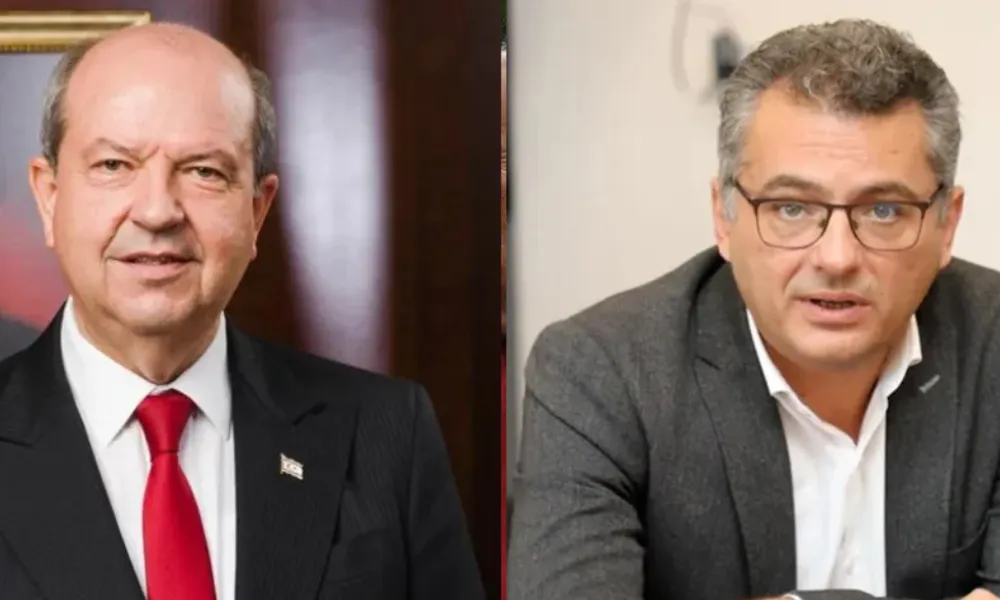By Yusuf Kanlı
The upcoming October 19 election for the Turkish Cypriot leadership has long ceased to be a mere leadership contest. It has become a referendum on identity and direction: whether the Turkish Cypriot community will consolidate its pursuit of sovereign equality and the two-state model, or re-engage with the United Nations framework for a bi-zonal, bi-communal resolution.
The result will shape not only the island’s diplomatic trajectory but also the balance of power within the Turkish Cypriot polity itself.
Two candidates, two philosophies
The incumbent, Ersin Tatar, supported by the ruling coalition of the National Unity Party (UBP), the Rebirth Party (YDP), and the Democratic Party (DP), stands for continuity.
His message has been clear: negotiations cannot resume until the Turkish Cypriots’ “sovereign equality” is recognized or, at the very least, until the international community enables what he calls the “three Ds” – direct trade, direct flights, and direct contacts. In his view, these steps would create conditions of parity even without formal recognition.
Tatar’s stance mirrors Türkiye’s official position since the collapse of the Crans-Montana talks in 2017. The principle of “sovereignty first, negotiation later” represents a deliberate departure from half a century of federation-based efforts. For his supporters, it is not isolation but liberation – emancipation from a negotiation framework they believe the Greek Cypriot side exploits to preserve the status quo.
Opposition leader Tufan Erhürman, heading the Republican Turkish Party (CTP), proposes a more pragmatic re-engagement strategy. He advocates “results-oriented negotiations” within UN parameters, tied to four key principles:
1. Political equality will not be re-negotiated.
2. A timetable will prevent endless rounds of talks.
3. Previously agreed issues will not be reopened.
4. If negotiations collapse, the process will not revert to the old status quo.
For Erhürman, this approach turns negotiation from a ritual into a practical process. It appeals to a generation of Turkish Cypriots weary of international limbo and the erosion of political identity that comes with isolation. His core argument is simple: sovereignty, like legitimacy, must be exercised through engagement — not through detachment.
The two-state resolution and its significance
Five days before the vote, the Turkish Cypriot assembly adopted a resolution reaffirming its commitment to a two-state settlement. The timing was deliberate. The session – boycotted by the CTP deputies – was less about policymaking than sending a political message: a warning to Erhürman and reassurance to Ankara that the ruling coalition remains firmly anchored in the doctrine of “sovereign equality.” Although the resolution carries no binding constitutional force, it serves as a symbolic instrument of restraint, framing any post-election deviation from the two-state line as political heresy rather than democratic choice.
The constitution, however, defines the person holding top office as the community’s leader, and long before the proclamation of independence, it has been customary that the Turkish Cypriot leader represents the people in intercommunal negotiations. No legislative act can morally revoke that mandate, even if the legislature could, in technical terms, attempt to restrict or suspend the leader’s negotiating authority. The real contest, therefore, will not be purely legal but predominantly political – fought through budgetary control, orchestrated rhetoric, and coalition pressure. The governing bloc’s move was designed precisely to increase the political cost of revisiting any federation-based framework.
If Erhürman wins
An Erhürman victory would put the institutional autonomy of North Cyprus to the test. He would face an assembly firmly aligned with Ankara’s two-state policy and a bureaucracy accustomed to its logic. His announced first step – an immediate visit to Ankara – shows an awareness that without coordination with Türkiye, any new negotiation initiative would be stillborn.
Diplomatically, Erhürman would likely start with confidence-building measures: facilitating Green Line trade, opening new crossing points, and revitalizing dormant technical committees. He would frame these not as steps toward federation but as instruments of coexistence, to ease domestic tension. Yet he would face two major obstacles: Ankara’s reluctance to soften its “sovereignty-first” stance and the Greek Cypriot leadership’s chronic unwillingness to share power even symbolically.
If Erhürman manages to produce early, tangible progress on trade, mobility, or cooperation, his domestic position would strengthen. Failure, however, would allow the ruling coalition to portray him as naïve or submissive to Greek Cypriot and Western agendas.
If Tatar is re-elected
A second Tatar term would institutionalize the status quo. He would continue to reject formal talks without recognition of Turkish Cypriot sovereign equality, while maintaining limited engagement through technical committees. This approach offers stability but also stagnation – it aligns with Türkiye’s regional policy but risks further isolating the north internationally.
Tatar may nonetheless seek to translate the two-state vision into functional reality: lobbying for charter flights to Ercan Airport, pushing for direct trade with non-EU partners, and promoting symbolic projects to showcase the viability of coexistence without federation. Such partial successes would reinforce his thesis of “recognition through practice” rather than “recognition through diplomacy.”
Yet his greatest vulnerability remains over-reliance on Ankara. Growing fiscal dependency and shrinking local autonomy render the claim of sovereignty increasingly rhetorical unless matched by genuine self-sufficiency.
The strategic equation
Ultimately, this election is about sequence: Should Turkish Cypriots insist on recognition before negotiation, or negotiate first to earn recognition through results?
An Erhürman win would reopen diplomatic channels but risk internal paralysis. A Tatar victory would ensure cohesion with Ankara but perpetuate diplomatic deadlock. Each path carries its own fragility – one political, the other existential.
The election will not solve the Cyprus problem. But it will determine which language the Turkish Cypriots will use to articulate their quest for equality – the language of international law and UN parameters, or that of de facto sovereignty and strategic patience.
